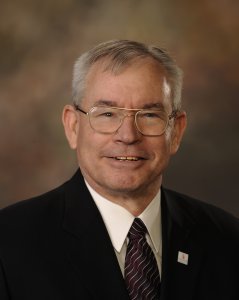
Lt. General Ronald L. Burgess Jr. spoke April 3, 2018, at Nichols College as part of the Master of Science in Counterterrorism program.
BY LORRAINE U. MARTINELLE
DUDLEY, Mass.—Former director of the U.S. Defense Intelligence Agency Lt. Gen. (ret.) Ronald L. Burgess Jr. spoke at Nichols College April 3, 2018, about cybersecurity threats to the United States. The presentation was sponsored by the Nichols College Master of Science in Counterterrorism program.
His presentation—titled “The Cyber Threat and Way Ahead”—addressed the roles government, private and public companies, and academia can play in combatting cyber threats to U.S. national security in an interconnected world. He also took questions from the audience after the talk.
“Burgess is never going to write a book,” General Burgess told the audience of students, faculty, staff, a colonel, two other generals, and other military personnel, referring to himself in the third person. “I took an oath. The Oval Office is off limits for questions.”
He quipped, however: “One thing an intel guy can do is talk.”
During his 38-year career in the U.S. Army, and now as senior counsel for National Security Programs, Cyber Programs and Military Affairs at Auburn University in Alabama, Burgess serves as a driving force in the U.S. intelligence community to safeguard national security interests. As head of the Defense Intelligence Agency and a former acting principal deputy director of national intelligence during the George W. Bush and Barack Obama presidential administrations, respectively, Burgess was a key player in the national security arena and was called upon by the presidents and Congress for his expertise. His leadership skills were used to focus the Defense Intelligence Agency on the greatest challenges confronting the United States at the time: Afghanistan, Pakistan, Iraq, transnational terrorism, and preventing strategic surprises elsewhere around the world.
Embattled U.S. Army Lt. Gen. Michael T. Flynn, who resigned in February 2017 as national security advisor under President Donald Trump, succeeded the retiring Lt. Gen. Burgess as director of the Defense Intelligence Agency in 2012.
With respect to Russia’s alleged influence in the 2016 presidential election between Trump and Democrat Hillary Rodham Clinton, General Burgess was blunt: “Do I think they (Russia) did? Probably. How far did they go? They didn’t change the vote from A to B. The fact it was Russia, OK. So what?”
Referring to technological capabilities of other countries, he said: “We’re very good at what we do. Russia is very good at what they do. China is getting better. North Korea? They’re not as good.”
In 2017, Nichols College Graduate & Professional Studies launched a leadership-focused Master of Science in Counterterrorism developed for those pursuing careers in the fields of intelligence, public policy, and security. Through an innovative in-class and online experience, students learn from counterterrorism experts the factors contributing to the radicalization process of violent extremism, and explore strategies to counter both terrorism and violent extremism. Nichols faculty saw a need to create this program for students once the Department of Homeland Security stressed the importance of countering violent extremism as a top priority for the United States.
“General Burgess has commended the Nichols College Master of Science in Counterterrorism degree, which is the first graduate program in the United States to exclusively focus on violent extremism,” added Professor McDowell-Smith, an internationally recognized expert in counterterrorism and violent extremism. “He has also applauded our relationships and partnerships with institutions, both domestically and internationally, in an effort to assist in combating national security threats.”
The General emphasized the important role higher education plays in educating a future generation of cybersecurity professionals.
“The United States always had a technological advantage, but over the last 10 years, that advantage has shrunk,” he said. “Academia has a role to play, along with government, industry, and individuals. We have a challenge in this nation in turning out adequate numbers of people with the skills in this area. You and your generation will have to address cybersecurity. We always have to think ahead.”
With respect to one audience member’s question about end-to-end encryption and whether private companies are obligated to turn over a customer’s device to law enforcement officials, General Burgess understood the hesitation of businesses. “Companies like Apple have taken a stance to protect their customer … I met Mr. (Apple CEO Tim) Cook. He’s a great American.”
Read media coverage of General Burgess’ April 3 talk at Nichols College:
- Telegram & Gazette, April 3, 2018: “Cybersecurity is Growth Industry, Former Intelligence Chief Ronald Burgess Tells Nichols College Audience“
- The Citizen Chronicle, April 3, 2018: “Former Director of U.S. Intelligence Agency Speaks at Nichols College“
- Worcester News Tonight, TV Charter 3, April 3, 2018: “Counterterrorism Expert Visits Nichols College”:
Lorraine U. Martinelle is director of public relations and social media at Nichols College in Dudley, Mass.